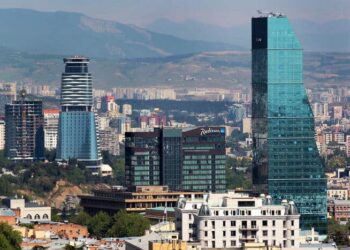The landscape of global trade has undergone profound changes since the end of World War II, moving from reconstruction to complex webs of regional and multilateral agreements. Initially, the focus was on creating a rule-based international system to prevent economic conflicts, leading to the establishment of GATT and later the WTO. However, the rise of regional blocs and shifts in global power dynamics have begun to challenge this system. Today, nations navigate through a maze of economic interests, security considerations, and shifting alliances. These transformations impact small countries like Georgia in an era where trade and regionalism are being reshaped.
In 1945, after World War II, a new balance of power was created. Everything was concentrated on reconstruction, avoiding major clashes between the powers, and creating a rule-based international system.
This shift also had its reflection in economic relations, marked by the introduction of the General Agreement on Tariffs and Trade (GATT). GATT ensured the reduction of tariffs, leading to the eventual creation of the World Trade Organization (WTO), where all members had their share. The World Bank, International Monetary Fund (IMF), and WTO established the three major pillars of the multilateral economic system, ensuring cooperation among countries.
Because of the devastating effects of military confrontation, economic battles acquired major importance. For such economic battles, the multilateral system served as a paramount arena while simultaneously fostering regional forms of cooperation. These regional forms materialized in free trade regimes and economic organizations such as NAFTA (later USMCA), the European Union Customs Union, the Commonwealth of Independent States and the Eurasian Union, the Council of Arab Economic Unity, the Economic and Social Council of the Arab League, ECCAS, APEC, CAREC, and financial institutions such as the Arab Monetary Fund and the Asian Development Bank, among others.
Georgia has a strategic advantage with its aspirations for EU membership, strategic partnership with the US, free trade regime with China, and significant trade relationship with Russia
Despite their regional nature, all these cooperation forms directly or indirectly contributed to building a rule-based system that served as a foundation for trade, cooperation, and security. It was often stated that guaranteeing freer trade promoted peace, and conversely, peace contributed to building better trade partnerships. Trade and investment opportunities have consistently demonstrated the value of a well-regulated multilateral system focused on cooperation, fair treatment, and development. This system specifically addressed developing economies with special and preferential treatment, widely accepted under the international trade regime.
As circumstances evolved, post-Cold War economic and military powers reshaped themselves. Alongside Western hegemony, counterbalancing powers like China emerged. China notably benefited from special and differential treatment as a developing economy.
In 2020, Brexit became a significant demonstration of nations prioritizing national interests over unified trade systems. This trend was accompanied by US policies under the Trump administration, including imposing tariffs on foreign products and implementing economic sanctions against competing powers such as Iran, China, and Russia. The policies related to strengthening regionalism, as opposed to multilateralism, were interrupted by global challenges like the COVID-19 outbreak and subsequent changes in the US administration. Over the last four years, these developments have contributed to questioning the further enhancement of globalization. The failure of trade and diplomatic relations to ensure peace in Europe culminated in the Russo-Ukrainian War, which further prompted revisions in European security and trade policies, reliance on Russian energy resources, and the rise of nationalist and conservative movements in major European countries. Meanwhile, China continues to invest heavily in developing countries and expand its global influence.
The election of a new administration in the United States reflects domestic and global demands for rethinking multilateralism. Developments in countries like Canada, Mexico, the United Kingdom, Germany, France, and the Baltic States underscore that the older forms of globalization are undergoing transformation. This shift is evident in the World Trade Organization’s (WTO) dispute settlement mechanism, which has been paralyzed due to the US refusal to appoint appellate body members, citing concerns over China’s advantages under special and differential treatment. Announcements from the US to continue using tariffs as a trade tool and reshape relations with key partners like Mexico and Canada signal that security and trade will take on new dimensions in the coming years.
Balancing trade relations and security issues will be crucial for future development, particularly in the case of countries like Georgia
For developing countries, this evolving landscape presents significant challenges. The absence of a clearly established rule-based international economic and security order complicates efforts to establish strong ties that guarantee economic and security benefits. Balancing trade relations will be crucial for future development, particularly in the case of countries like Georgia. Regionalism’s new approach leaves little room for reliance on the international rule-based system for trade policy. Instead, balancing trade and security issues is paramount, as tariffs and sanctions could become more prevalent until robust cooperation frameworks emerge.
Georgia, for instance, has a strategic advantage with its aspirations for EU membership, a strategic partnership with the United States and free trade regime with China and significant trade relationship with Russia. However, its historical passivity within multilateral trade mechanisms means it must strike a delicate balance between the interests of global superpowers. Trade barriers in any form could immediately impact investments and trade, particularly for a country bordering Russia and serving as a gateway between Asia and Europe. Weakening ties with strategic partners, regardless of geographic proximity, would be detrimental and risky, as Georgia lacks the resources to thrive in an era defined by tariffs, sanctions and regionalism.
In conclusion, the evolving dynamics of trade and regionalism emphasize the need for carefully balancing trade partnerships and security considerations. While geographic conditions, trade corridors, and product pricing remain important technical aspects, they must not overshadow the risks associated with partnering with powers like China and Russia, which could trigger sanctions or other economic repercussions. Fostering balanced trade and security partnerships while maintaining loyalty to multilateral systems like the WTO and regional economic unions can provide small economies like Georgia with fair opportunities in the global market. Georgia’s unique position, combined with its strategic alliances, offers the potential to navigate these challenges effectively, ensuring its resilience and progress in an era of shifting trade dynamics.
By Buba Bagdavadze, Expert in International Trade Regulations














